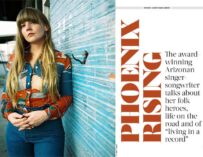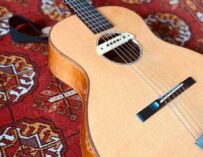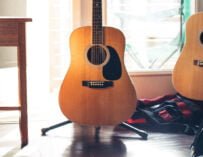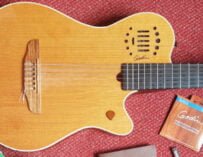
Great to have an acoustic guitar on your tracks. Photo: Johannes Weber (Unsplash)
If you’re not getting the most out of your acoustic then the Scottish singer-songwriter is here to lend a hand
The acoustic guitar is an intimate and earthy instrument. Its sound is fragile and flawed, reflecting the humanity of its player. It is undeniably beautiful and is, without doubt, my favourite instrument in the world. (Also portable – a feature not to be overlooked, especially if you are a pianist).
And yet it is ubiquitous. Other instruments are a feature, something to shout about. A new pop star who plays solo bassoon you say! If you are a guitarist you are part of the masses. The guitar is the Ford Fiesta of the songwriting universe.
So many album covers feature legendary songwriters peering out from behind their iconic guitars. It’s like my idols are saying, ‘An acoustic guitar is all you need to be a great songwriter.’ If that’s the case then why do I find myself sitting behind my acoustic guitar with absolutely nothing to say? So I thought I would write seven tips on how to cope in that situation, how to write songs when your acoustic guitar doesn’t want to play ball…
1. TRY A DIFFERENT TUNING
Now I know this isn’t a new one but bear with me. I think the main object of alternate tunings is to get out of muscle-memory movements that your fingers automatically make on the fretboard. Joni Mitchell said, “If you’re only working off what you know, then you can’t grow.” She accented how using different tunings enabled her to surprise herself more frequently. You are led by your ears and innate musical sensibility. You aren’t mimicking, you are discovering. It’s immediately exciting!
Don’t just experiment with the usual drop D, DADGAD and open chord tunings, though these hold a wealth of songwriting in and of themselves. Trying dropping a string or two just for fun. For example, I recently wrote a riff that needed an open string drone that wasn’t there in standard tuning. When I dropped one string down a semitone, the riff, as well as the whole song, opened up in front of me. Apparently, Joni has used more than a mind-boggling 51 tunings in her songs.
As a small addendum, be prepared to play some truly terrible-sounding chords when using alternate tunings. The downside to a surprise is that it’s not always pleasurable.

Tommy Ashby: “Within each guitar there hides a new song, one entirely its own.” Photo: Matthew Bowen
2. PRACTICE GUITAR FOR GUITAR’S SAKE
On many occasions, I have sat down to practice a specific technique on guitar and have stumbled on a new song. It happens too often to be a coincidence. I’ve occasionally heard musicians say that becoming too technically proficient will remove some of their artistry. I think the main thing to remember is that technical proficiency is there to serve the music, not the other way around.
There is real joy in practice for practice’s sake. Songwriting-wise there’s no pressure, nothing in particular to be gained and taken away. This revelation might unlock your songwriting creativity by freeing you from the weight of expectation. If any new ideas do come along then you’ve nabbed them for free!
By being proficient on an instrument you can become an asset to other people’s songwriting and recording too. My main job before becoming an artist was as a session guitarist. This got me in the studio, where I could watch how other people expressed their creativity. I have cultivated many creative techniques and ideas from watching and working with others. Knowing how other songwriters wrote and recorded songs also reduced the imposter syndrome to which I am prone. This helped when it became time to record my own songs.
3. TRY A DIFFERENT GUITAR
I tried for ages to find a quote on this but couldn’t so I’ve decided to write my own. Simply put: ‘Every guitar has its own song’. What I mean is that within each guitar there hides a new song, one entirely its own. Older guitars are grizzled and weather-worn; brand-new guitars are bright and energetic. There are some songs that I have written that I can only physically play on certain guitars. With other songs it is the sound of the guitar that speaks the song, others just don’t engage in the same way. I am prone to anthropomorphism when it comes to guitars.
There are quite a few reasons why I didn’t suggest this first. The major reason is that your house can quickly fill with guitars, which may cause friction with partners, housemates, children, cats… I would possibly suggest that guitars can leave as well as arrive (this advice made my girlfriend laugh out loud when she was proofreading this…)
The second major reason is cost. This one I would also refute slightly. Very few of my guitars are expensive. Try a friend’s guitar, borrow it even, try the in-house guitar at a jam session, sit for as long as possible in a guitar shop. Try to vary the guitar type; a nylon string, a baritone, a hollow body. They all have the ability to transport you somewhere else. I bought an old bashed-up nylon string for £10 a few months ago and it has more than paid me back in songs.
This leads nicely onto the next point…

Tommy Ashby: “On many occasions, I have sat down to practice a specific technique on guitar and have stumbled on a new song.” Photo: Drew Shearwood
4. EMBRACE FLAWS
Don’t just go for a beautiful-sounding guitar. Obviously, in certain contexts, this is exactly what is required. Yet I have often found that the more beautiful sounding guitar, the worse my songwriting stupor becomes. Rough-sounding guitars, ones that make you work, seem to reflect that work in their sound. They force you out of your usual tropes, into that surprising original sound for which you were searching. Go for an unusual sound, something interesting, a strong voice.
As a small aside, with truly beautiful-sounding guitars I have often found myself just repeatedly playing a G chord and exclaiming at the resonance, quality, etc. This has often led to distraction and procrastination, often the anathema of songwriting.
Dave Rawlings found an old Epiphone Olympic bashed up in a garage and went on to create so many amazing songs. He has singlehandedly led to an explosion in the price of that guitar, if you can find someone willing to sell one. James Bay did it with his vintage Epiphone Century, which I don’t think was a super-fashionable guitar until he started playing one.
5. GO ELECTRIC
Yep, I said it. And I don’t entirely mean ignore acoustic guitars altogether. I just mean plug them in. I recently toured with the band Turin Brakes and they get some truly original sounds out of their amplified acoustics. John Martyn created whole worlds with delays, overdrives and his acoustic. Ben Howard too. Creating these soundscapes can inspire a different direction in your writing.
And then there is the electric guitar world. I’ve written so many songs that I would have only found using an electric guitar. With an electric guitar, you get another instrument with totally different tonal qualities and you don’t have to relearn anything about tunings. Just don’t get too lost in the world of pedals and electric guitars and forget that you wanted to write a song in the first place. Though to contradict myself, detours are not necessarily a bad thing and pedals are great. Almost always better to choose the road less travelled.

Tommy Ashby: “Be prepared to play some truly terrible sounding chords when using alternate tunings.” Photo: Matthew Bowen
6. TAKE INFLUENCE FROM OTHER MUSICAL STYLES
Some of the most interesting songwriters have found a way of merging disparate guitar styles. Neil Young melded folk and blues guitar together, as has Hozier. You can hear flamenco influences in Leonard Cohen and Nick Mulvey. These flavours create an atmosphere again. The only thing I would say is respect the genre or style from which you are influenced. Maybe go back to the beginning of that style and find the original architects. Really dive in and find something you love. Only then can you avoid something sounding inauthentic or pastiche. But if you really dig in then there is so much to find.
7. TRY A DIFFERENT INSTRUMENT
This is my when all else fails ejector seat. I’m not a piano player by any means but messing around on piano can get a song started. I can then jump back and forth between guitar and piano, injecting competence and incompetence in equal measure. I think it’s a great way of connecting the childlike-play/discovery half with the craftsmanship half.
Instruments like banjo and mandolin are similar to guitar in terms of technique. But each holds a new tonal palette for you to open. Old Crow Medicine Show often use a six-string banjo in their setup, a brilliant-sounding instrument which is tuned like a guitar. It creates an atmosphere and you don’t even need to learn any new chord shapes.
In my studio, I have a whole bunch of instruments within arms reach. Anything that might start off the creative spark. Ultimately that is what you are chasing. That little idea that you know could be something. Then you can shape that idea, use your craft to create the world in which that song lives.



































Related Articles